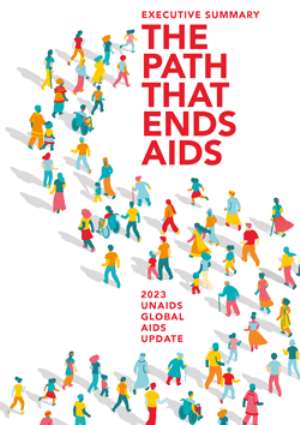
The number of people on antiretroviral treatment worldwide rose almost fourfold, from 7.7 million in 2010 to 29.8 million in 2022, according to UNAIDS annual reports.
Thanks to the support and investment in ending AIDS among children, 82% of pregnant and breastfeeding women living with HIV globally were accessing antiretroviral treatment in 2022, up from 46% in 2010. This has led to a 58% reduction in new HIV infections among children from 2010 to 2022, the lowest number since the 1980s.
The report further confirmed that progress in the HIV response has been strengthened by ensuring that legal and policy frameworks do not undermine human rights, but enable and protect them. Several countries removed harmful laws in 2022 and 2023, including five (Antigua and Barbuda, the Cook Islands, Barbados, Saint Kitts and Nevis, and Singapore) that have decriminalized same-sex sexual relations.
“The end of AIDS is an opportunity for a uniquely powerful legacy for today’s leaders,” said Winnie Byanyima, Executive Director of UNAIDS. “They could be remembered by future generations as those who put a stop to the world’s deadliest pandemic. They could save millions of lives and protect the health of everyone. They could show what leadership can do.”
"We are hopeful, but it is not the relaxed optimism that might come if all was heading as it should be. It is, instead, a hope rooted in seeing the opportunity for success, an opportunity that is dependent on action,” said Ms Byanyima. “The facts and figures shared in this report do not show that as a world we are already on the path, they show that we can be. The way is clear.”
In 2022, an estimated:
- 39.0 million people globally were living with HIV
- 29.8 million people were accessing antiretroviral therapy
- 1.3 million people became newly infected with HIV
- 630 000 people died from AIDS-related illnesses
UNAIDS
The Joint United Nations Programme on HIV/AIDS (UNAIDS) leads and inspires the world to achieve its shared vision of zero new HIV infections, zero discrimination and zero AIDS-related deaths. UNAIDS unites the efforts of 11 UN organizations—UNHCR, UNICEF, WFP, UNDP, UNFPA, UNODC, UN Women, ILO, UNESCO, WHO and the World Bank—and works closely with global and national partners towards ending the AIDS epidemic by 2030 as part of the Sustainable Development Goals.




 EC’s request to use Ghana Card as sole document for identification would’ve prev...
EC’s request to use Ghana Card as sole document for identification would’ve prev...
 Voter registration: Always check to avoid 2020 election results errors — Kwamena...
Voter registration: Always check to avoid 2020 election results errors — Kwamena...
 Voter registration: Ghana isn't safe; December polls might be 'each one for hims...
Voter registration: Ghana isn't safe; December polls might be 'each one for hims...
 Rapid decline of our country, its democratic institutions worrying, distressing ...
Rapid decline of our country, its democratic institutions worrying, distressing ...
 Religious tolerance: My brothers and sisters are Christians, I cannot say that I...
Religious tolerance: My brothers and sisters are Christians, I cannot say that I...
 CSOs consider civil action against gov't over alleged destruction of protected f...
CSOs consider civil action against gov't over alleged destruction of protected f...
 Domelevo, Kpebu, Gyampo and 83 others petition parliament to probe EOCO’s conduc...
Domelevo, Kpebu, Gyampo and 83 others petition parliament to probe EOCO’s conduc...
 “Take precaution, don’t be in a hurry to go and die” — Author advise drivers, pe...
“Take precaution, don’t be in a hurry to go and die” — Author advise drivers, pe...
 Electoral Commission has been reduced to 'Error Commission' in simple arithmetic...
Electoral Commission has been reduced to 'Error Commission' in simple arithmetic...
 Banking clean-up helped prevent collapse of financial sector – Bawumia
Banking clean-up helped prevent collapse of financial sector – Bawumia
